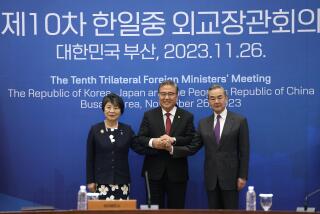Obama will tout nations’ progress on three-day Asia tour
WASHINGTON — Coming off his victory on the home front, President Obama is headed abroad for a quick trip through a trio of Southeast Asian countries, a tour aimed at highlighting what the administration views as seeds of foreign policy successes.
In a three-day tour that starts Sunday with stops in Thailand, Myanmar and Cambodia, Obama will tout democratic reforms, opening markets and human rights advances in the region as affirmation for his dual goals of shifting focus from the Middle East to the Asia-Pacific region and ramping up diplomatic engagement with formerly isolated nations.
The latter effort has yielded few clear breakthroughs under Obama’s first term, perhaps with the notable exception of Myanmar, the once-secretive nation emerging from decades of authoritarian rule. Although some of the economic and diplomatic pressure that spurred the shift predates the president’s tenure, the Obama administration has been eager to hold up Myanmar as a victory, though still incomplete, for its diplomacy and a model for countries that may seek to return to U.S. favor.
Previewing the visit, the first by a U.S. president, national security advisor Tom Donilon said Thursday that Obama’s goal was to “lock in the progress” that has been made by encouraging the Myanmar government to continue on its path and by cheering on opposition and human rights leaders pushing for more. He said North Korean leaders in Pyongyang ought to be watching the new relationship with interest.
“That is a path that, if North Korea would address the nuclear issue, would be available to them,” Donilon said in remarks at the Center for Strategic and International Studies, a Washington think tank. “We have said that from the outset. It’s an important example for them to contemplate.”
Donilon acknowledged that he saw no evidence of North Korean leaders moving in that direction. North Korea is among a handful of places where the Obama administration has come up short in its strategy of reviving diplomatic channels that had been cut off.
Critics argue that Obama’s visit to Myanmar, also known as Burma, may be premature, pointing to the hundreds of political prisoners, the fragile cease-fires involving ethnic conflict in many areas, and the recent clashes between military leaders and Rohingya Muslims, a minority group seeking recognition and citizenship rights.
“If President Obama doesn’t put his full weight behind further urgent reforms in Myanmar, this trip risks being an ill-timed presidential pat on the back for a regime that has looked the other way as violence rages, destroying villages and communities just in the last few weeks,” said Suzanne Nossel, executive director of Amnesty International USA.
Obama’s aides said the president was mindful that the nation was still in transition. He will be meeting with President Thein Sein and opposition leader and Nobel Peace Prize laureate Aung San Suu Kyi, who spent most of 20 years under house arrest for resisting the military-controlled regime. Obama will visit with Suu Kyi at the home where she was imprisoned. He’ll also meet privately with activists and other leaders at Yangon University, where he is to deliver a speech outlining his vision for nascent democracies like Myanmar’s.
“This is not a victory celebration, this is barn-raising,” said Danny Russel, senior director for Asia with the White House National Security Council. “This is a moment when we believe that the Burmese leaders have put their feet on the right path and that it’s critical to us that we not miss the moment to influence them, to keep them going.”
Obama will have other missions on his trip. He’ll travel first to Bangkok to meet with Thai Prime Minister Yingluck Shinawatra and King Bhumibol Adulyadej, before heading to Myanmar. From Yangon, formerly known as Rangoon, Obama is to attend meetings of the Assn. of Southeast Asian Nations and the East Asia Summit, which are convening in Phnom Penh, Cambodia.
The president’s dash to the region so soon after his election underscores his commitment to boosting U.S. influence and alliances in the region, White House aides said.
But his actions also will be closely watched by China. Obama’s shift of diplomatic attention and resources to Asia has been viewed with suspicion in Beijing, where it is seen as an effort to contain Chinese influence. Obama’s visit may signal how he will recalibrate the U.S. relationship with China in his second term.
kathleen.hennessey@latimes.com
More to Read
Start your day right
Sign up for Essential California for news, features and recommendations from the L.A. Times and beyond in your inbox six days a week.
You may occasionally receive promotional content from the Los Angeles Times.







